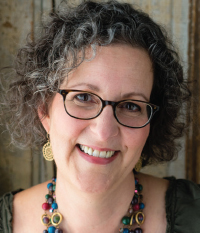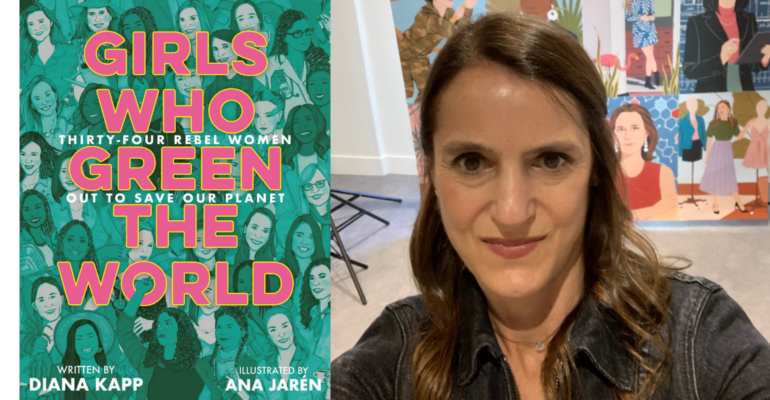Journalist and author Diana Kapp may live in San Francisco but unlike the song, her heart is in the Sawtooth Mountains of Idaho, where she and entrepreneur husband David Singer co-own a 900-acre guest ranch with her brother and sister-in-law. Nature is her happy place, whether out running, climbing, or camping, and her three kids have inherited that love and appreciation for outdoor adventure.
So it’s hardly surprising that after many years working as a freelance journalist — her work has appeared in the New York Times, San Francisco Chronicle, ELLE, O the Oprah Magazine, Wall Street Journal, Sunset, and many more — and the publication of her wildly successful first book, “Girls Who Run the World,” in 2019, the subject of her second book reflects her love and concern for our earth, and the urgent climate crisis that confronts us all. In “Girls Who Green the World: 34 Rebel Women Out to Save the Planet,” Kapp interviews 34 women who are “environmental changemakers” in the fields of health, waste reduction, food, clean energy, tech, and climate activism, working every day to save our planet.
“These women are all doing great things in service of the pressing climate issues of our time,” shares Kapp. “Young women in particular need role models like these, and they just aren’t getting enough airtime.”
Her own children were the impetus behind the research. “The goal of the book is to do something hopeful and positive around the issue of climate change,” says Kapp. “The narrative has gotten so gloom and doom, and young people have increasing anxiety about climate issues. It’s become a truly psychological issue, especially with the advent of the pandemic. Kids feel sadness, anger, and real fear about the future of our planet.”
Kapp kicks off the book with a cautionary tale from the late ‘80s, when the growing hole in the ozone layer was the top story. Susan Solomon, a computational chemist specializing in complex atmospheric modeling, was the lone female scientist in a sea of men at an emergency meeting held in Boulder. She volunteered to lead a team of researchers at the South Pole, and while the other scientists present at the meeting scoffed at her theory of CFCs (chloroflourocarbons) as the root cause, her on-site research bore out her claim, and the world united at a summit in Montreal to stop the bleed. So, we know that it’s possible for international action to be taken and that the science must be followed. “If we take action, we can find solutions,” asserts Kapp.
“I came to these books through my own circuitous path,” says Kapp. “I wish I had understood more about myself, had aimed higher. I became an English major [at University of Michigan] because my mother was. I moved back to DC after college and worked a series of jobs where I was a glorified assistant — politics, nonprofits, etc. I feel like I was asleep for many years. Jobs always sounded good, but they were boring.”
After a few years back in the DC area where she was raised, Kapp got a notion in her head that California was where she belonged. “I got a lead through a family friend that there was a tech company about to go public that needed help with marketing and investor relations. This was the first time a job was too big for me. Endless opportunities exist in building something. I was bitten by the positivity of entrepreneurship and my job translating technology to lay people. Of course, I was learning as I went along since I knew absolutely nothing about technology at the start. Then it was off to Stanford for my MBA. As a female, I felt the need to prove myself, to be able to support myself. I wanted a degree I could fall back on.”
“My first job out of business school was with an ad agency, and one of my first accounts was Nike and their women’s line. I loved the storytelling aspect of ad agencies, so I soon felt the strong pull of telling stories that matter. For the last 20 years, I’ve been writing for magazines and newspapers.”
As with her first book, “Girls Who Green the World” is stocked in the Teens & Young Adult section of local bookstores, but as it turns out, moms and grandmas are not only buying it for their daughters and grandkids, but they are reading it themselves, too. Kapp’s followers on social media bear that out. These books have range. “My daughters helped edit the book,” says Kapp. “They would write ‘CRINGE!!!’ in the margins if I tried to attempt any teen speak in my effort to connect with the audience. I learned quickly that that was a major faux pas for my target readers.”
The next generation’s biggest issue is the environment, and Kapp’s kids views on climate change pointed her in the right direction. “All of our family trips growing up were camping trips in the U.S. with the Sierra Club — nature, hiking, backpacking — and I still find those activities bring centering and meaning to my life. I consider the outdoors as my religion. But truthfully, I hadn’t given much thought to environmental issues [in recent years], consumed by other crises in healthcare, civil rights, women’s rights, and more. When I started seeing this issue through the eyes of my kids, it really changed my perspective.”
“Girls Who Green the World” chronicles the trials and tribulations of women like Dr. Mona Hanna Attisha, a health activist and pediatrician in Flint, Michigan, who first blew open the story on the toxic water supply; Kaitlin Mogentale, Founder and CEO of Pulp Chips, where tons of pulp leftover from commercial juicing is transformed into delicious baked chips; Rhea Mazumdar Singhal, Founder and CEO of Ecoware, a company in New Delhi, India that recycles sugar cane fibers into biodegradable “paper” products; and Caroline Danehy, co-founder and CCO of Fair Harbor, where over 4 million plastic bottles have been upcycled into bathing suits. Creative problem-solvers, all.
“Since America’s birth in the late 18th century, the world population has increased from 760 million to 7.6 BILLION people. The planet simply cannot support what we are doing to it. We need to upcycle, recycle, compost, etc.,” says Kapp. “I’m encouraging all people to get political. Midterms are coming up. Where do climate-friendly candidates need our help? Whatever you’re interested in — food, fashion, arts, etc. — there’s something to do, action to take.”
That action is not limited by gender. “These books aren’t only for girls,” says Kapp. “Why shouldn’t boys get to learn about these kick-ass changemakers and solution-seekers? Why should only girls care about strong, fearless women who are making a difference? It’s my great hope that boys and men and fathers read these books, too.”
More From Better:
- Chicago’s Most Powerful Women 2022
- This Sleek Napa Guest House Is Where a Busy Tech Executive Goes to ‘Get Away’ from his Getaway Home
- Reframing our Relationship with Death: COVID-19 Gives Motivation, but No Instructions

Julie Chernoff, Better’s dining editor since its inception in 2007, graduated from Yale University with a degree in English — which she speaks fluently — and added a professional chef’s degree from the California Culinary Academy. She has worked for Boz Scaggs, Rick Bayless, and Wolfgang Puck (not all at the same time); and counts Northlight Theatre and Les Dames d’Escoffier International as two of her favorite nonprofits. She currently serves on the national board of MAZON: A Jewish Response to Hunger, an advocacy group addressing hunger issues in the U.S. and Israel for the nearly 46 million people — veterans, children, seniors, tribal nations, and more — who go to bed hungry every night.

